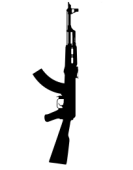 My recent Beyond Boundaries column for The Psychologist explores how the micro-culture of Colombian paramilitary organisations may have shaped the expression of post-traumatic stress disorder in demobilised fighters.
My recent Beyond Boundaries column for The Psychologist explores how the micro-culture of Colombian paramilitary organisations may have shaped the expression of post-traumatic stress disorder in demobilised fighters.
Dr Ricardo de la Espriella’s office is surprisingly quiet. Buried deep within San Ignacio University Hospital, the growl of the chaotic Bogotá traffic is perceptibly absent. Despite the street-level pandemonium, the capital city of Colombia remains an oasis of relative calm in a troubled country. The five-decade-old conflict has been pushed back from the urban fringes and persists, unabated, in the rural areas where it continues to devastate the country’s diverse cultural landscape. Dr de la Espriella has long promoted an understanding of how psychological distress is filtered through cultural norms. ‘There are difficulties in recognising post-traumatic stress in certain populations, which is why cultural psychiatry is so important’ he stresses, highlighting the surprising variation in response to suffering. In this case, however, he is not talking about the culture of ethnic or racial groups, but the micro-culture of illegal paramilitary organisations.
While working on a project to rehabilitate ex-members of illegal armed groups, he noticed a striking absence of post-traumatic stress disorder in his patients, despite them having experienced extreme violence both as combatants and civilians. Many had taken part in massacres and selective assassinations, and many had lost companions to equally brutal treatment. There were high levels of substance abuse, aggression and social problems, but virtually none showed signs of anxiety. Intrigued, de la Espriella decided to investigate more closely and carefully interviewed the ex-paramilitary patients again, using the Clinician Administered PTSD Scale, which asks specific and detailed questions about post-trauma symptoms. After this more detailed examination, more than half could be diagnosed with the disorder.
The reason for why none of these symptoms presented in day-to-day life seemed to lie in paramilitary subculture. While aggression and drug abuse are tolerated, anxiety is taboo to the point where members showing signs of anxiety can be killed by their compatriots for being ‘weak’. This brutal emotional environment shapes the men to neither show nor spontaneously report any form of fear or nervousness. De la Espriella reported his findings in the Colombian Journal of Psychiatry where he discusses the difficulties in treating people who have been involved in violence and killing. His work also raises the uncomfortable question of who we consider to be a victim of conflict. Can we extend compassion to those who commit the atrocities or do we allow those who swim in the tides of war to drown in its powerful currents?
Thanks to Jon Sutton, editor of The Psychologist who has kindly agreed for me to publish my column on Mind Hacks as long as I include the following text:
“The Psychologist is sent free to all members of the British Psychological Society (you can join here), or you can subscribe as a non-member by going here.
Link to column from The Psychologist (bottom of page).
… mmm… Sarah is no longer there… so the reply to my email to her address says…